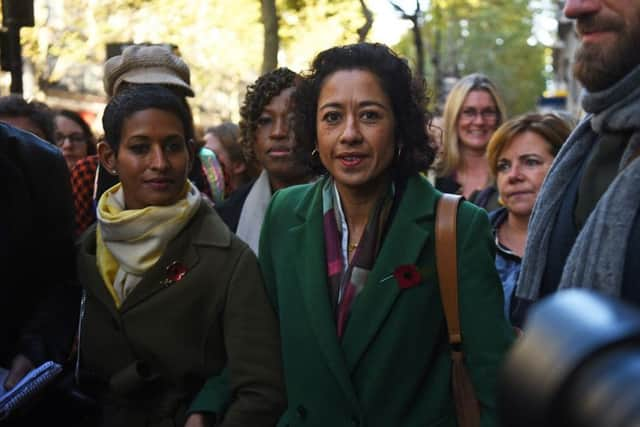Jeremy Corbyn’s rape clause claim says much about women’s rights today – Laura Waddell


Women and institutions have never had a smooth relationship. It’s a wonder we’ve got any patience or trust left.
As a society, we’ve become more accustomed to recognising and challenging prejudice and pay discrepancies, bolstered by changes in the law and more women entering public conversations. But historic revelations and new incidences alike continue to unfold while legal battles rumble on. Each time, they remind us anew how women are undervalued and undermined.
Advertisement
Hide AdAdvertisement
Hide AdNewswatch presenter Samira Ahmed is currently involved in a pay dispute with the BBC in a case backed by the National Union of Journalists (NUJ), claiming to have been paid up to 85 per cent less than male hosts on equivalent audience feedback format shows, such as Jeremy Vine’s Points of View.


In a notable statement of solidarity, Ahmed was accompanied to the tribunal on Monday by fellow presenter Naga Munchetty, who faced her own employment scism recently. It played out dramatically when Munchetty’s on-screen comments on racism were publicly admonished by her employers and then, in the face of huge public backlash, quickly retracted. It was revealed that only one complaint had led to the excruciatingly ill-conceived reprimand, which tied itself in linguistic knots attempting to justify rebuking a woman for talking about the racism she had experienced.
The Munchetty episode was in sharp contrast to the corporation’s swift and unyielding defence the month prior for its political editor Laura Kuenssberg, who drew a high volume of complaints in response to highlighting the identity of an impromptu Johnson protestor, the father of an ill child in hospital at the time of a visit by the PM, on her Twitter account with over one million followers.
The move was criticised by many with concerns over undue attention and scrutiny directed at a member of the public, and those familiar with digital abuse who highlighted the tweet’s potential to aid online backlash. But the rapidity with which the BBC conflated and dismissed all complaints as bizarre suggests these points received less consideration overall than the gripe of Munchetty’s sole detractor.
Out-of-touch veterans
Undoubtedly, journalists and broadcasters receive a staggering amount of online abuse and tedious claims of bias. Laura Kuenssberg is herself a frequent target of harassment that is sexist in nature. But protecting staff from malevolence and aggression shouldn’t come at the expense of reflecting on legitimate criticism. Clearly, mistakes are made. It might be a completely different department, but it doesn’t help retain depleting faith in editorial judgement, when other decisions have been so publicly and badly ill-judged.
The ongoing rumble of high-profile pay disputes and scandals, contrasted with staggeringly high fees received by out-of-touch veteran radio personalities, have long suggested broadcasting has deep problems with an unequal culture. There will always be the complication of quantifying star appeal in on-screen talent, where ‘worth’ is akin to weighing expertise in other sectors, and it seems this is the area where problems continally arise, and is most vulnerable to gender or racial prejudices.
The general pattern emerging from sector disputes is one rule for some, and not for others, with women and racial minorities most likely to be undervalued. What else is new? These TV dramas mirror general society.
Things are equally dismal in politics. Last week Corbyn took a saunter around Motherwell, where, with customary sustained refusal to get a grip on devolved matters, he accused the SNP of being unwilling to scrap the rape clause.
Advertisement
Hide AdAdvertisement
Hide AdHis novel idea will be news to SNP MP Alison Thewliss, who has been at the forefront of campaigning against the non-devolved matter, along with the other politicians standing alongside her to oppose it (such as, memorably, ex-Scottish Labour leader Kezia Dugdale) or myriad clued-up civilians in Scotland joining protests. It’s all the more surprising given Corbyn paid tribute to Thewliss for her efforts a couple of years ago in parliament. One wonders what women in Wales, where Labour are in power and the rape clause is in effect, make of such breezy remarks.
Rape clause not a political football
It’s at least four-and-a-half hours on the train from London to cental Scotland. Next time he pays a visit, maybe Corbyn can use some of that time to go over the very basics of devolved matters, and understand the anger about imposition of such policies. The voters who abandoned Scottish Labour in droves won’t be persuaded back easily. Demonstrating a sharper understanding and taking a more honest tack might encourage greater trust in the grand federalisation plans so routinely polished off and propped up.
But on principle alone, the rape clause is a matter too important and meaningful for blasé sophistry on a walkabout, nor is it best tackled by deflecting ire away from the Conservative Government who enacted it. Those who care about this issue are likely to know who is responsible for it. Kicking it about like a political football is a dire move.
One might have also have imagined that in the wake of council equal-pay scandals, their legacy still stretching council budgets and remaining sharp in the memory of many local women who were impacted, Labour would tread carefully on matters pertaining to women and our economic and social welfare. But when it comes to priorities, there’s the many, and then there’s the few, and then there’s Scottish working-class women at the bottom of the list.
The problem is, we often want to believe in and support these institutions. We want a public service broadcaster whose judgement we can respect as much as staff can trust they’re fairly renumerated. Nobody wants to be at war with their council. Many voters want to see Labour win seats down south, but are endlessly frustrated by their handling of Scottish matters. You might think, how hard can it really be to do better on some of these things? But as has ever been the case, the undervaluing of women is widespread throughout society. There’s a system, and women are the bug in it.
